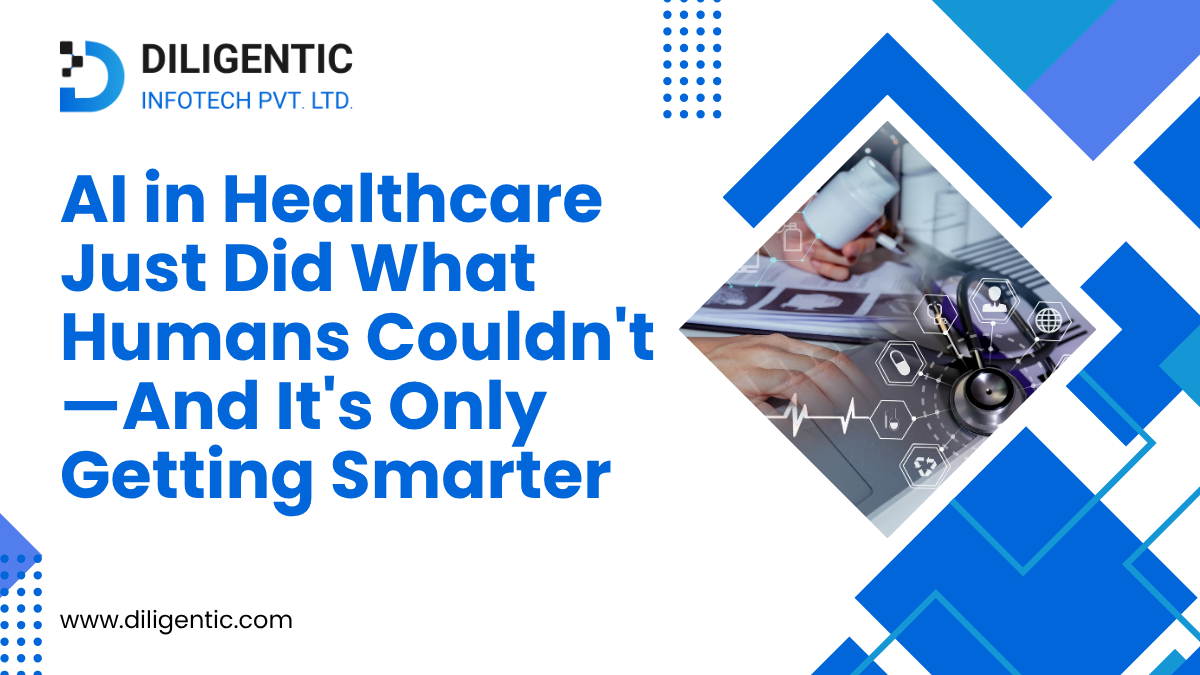SHARE

AI in Healthcare Just Did What Humans Couldn’t, And It’s Only Getting Smarter

AI in healthcare is no longer a futuristic idea. It’s actively detecting diseases faster than doctors, automating repetitive tasks, saving thousands of work hours, and making healthcare more accessible. This article breaks down how AI is transforming healthcare systems, its benefits, real-world examples, and what the future of AI in healthcare holds, all presented in clear, simple language.
Table of Contents
What Is AI in Healthcare?

AI in healthcare uses smart computer systems to help with medical tasks, like understanding language, recognizing images, and learning from data. This can include diagnosing illnesses, managing patient records, and predicting health risks.
But unlike common fears, AI is not replacing doctors. It’s making their work faster, more accurate, and more efficient. Doctors still lead the process, but now they’re supported by systems that never get tired, don’t miss patterns, and process huge data sets in seconds.
How Is AI Used in Healthcare?

The use of AI in healthcare is growing fast. Below are some key areas where it’s already making a major impact:
1. Diagnosing Diseases Faster
AI tools can read medical images like X-rays and MRIs faster and, in many cases, more accurately than radiologists. Tools like Aidoc highlight tumors, fractures, and strokes in seconds, allowing doctors to focus on urgent cases without delay.
2. Automating Medical Reports
In hospitals, writing reports takes time. With generative AI tools, doctors can now get help drafting patient summaries and prescriptions. Rad AI helps radiologists save hours daily by auto-generating initial drafts of reports.
3. Remote Patient Monitoring (RPM)
AI-powered devices track patient vitals like heart rate, oxygen levels, and temperature in real-time. If the system detects something unusual, it alerts doctors automatically; there is no need for the patient to visit the hospital unless necessary.
AI is also transforming how care is delivered remotely. Learn more in our blog on what is telehealth.
4. Predictive Health Alerts
AI in healthcare systems can identify risks before symptoms appear. For example, by analyzing patient history and current data, AI can predict the chances of sepsis, heart attacks, or even opioid addiction. Hospitals can interfere early and save lives.
5. Speeding Up Billing and Admin Work
AI is now used to handle billing and insurance claims faster. It helps hospitals save hundreds of work hours each week by automating tasks like data entry, claim processing, and appointment updates, tasks that earlier took hours or even days.
Benefits of AI in Healthcare
There are many benefits of AI in healthcare that go beyond just speed or convenience:
- Fewer human errors: AI detects tiny details humans might miss.
- More time for patients: By automating paperwork, doctors spend more time with people.
- Lower healthcare costs: With fewer admin tasks and errors, operations run more efficiently.
- Better access in rural areas: AI tools, apps, and chatbots bring healthcare to places with fewer doctors.
- Personalized treatment: AI analyzes a person’s unique health data to offer tailored plans instead of a “one size fits all” approach.
Real-World Examples of AI in Healthcare
Aidoc
This AI software helps doctors identify critical findings in brain scans within seconds, such as brain bleeds, so that they can treat emergencies quickly.
Heidi Health
In Australia, clinics use Heidi Health’s AI to generate clinical notes based on doctor-patient conversations, reducing time spent on manual record-keeping.
These examples of AI in healthcare show that the technology isn’t just for big hospitals. It’s becoming part of daily life and a tool that people can use directly.
AI in Healthcare Systems: What’s Changing?
AI in healthcare systems isn’t just about software; it’s changing how hospitals operate.
- Quicker patient intake with voice assistants that gather symptoms.
- Faster drug research through AI models that simulate how drugs interact with the body.
- Efficient supply chains that forecast demand for medical supplies.
More hospitals are integrating these tools because of their clear impact, faster care, fewer mistakes, and more accurate data.
AI Trends in Healthcare

The AI trends in healthcare are shaping how future hospitals and clinics will function:
- Generative AI is being used to write clinical notes, assist with mental health support, and even suggest treatment plans.
- Wearables and sensors track health data 24/7. AI then uses this data to detect issues early.
- Voice recognition tools are replacing forms; patients can now describe symptoms verbally, and AI records them properly.
- Bias detection in AI tools is becoming a priority. Health companies are working hard to reduce AI errors that affect certain groups more than others.
- Cloud-based AI models are making tools like Google’s MedLM available to clinics worldwide.
Comparison Table: AI vs Traditional Healthcare Methods
| Task | Traditional Method | AI Healthcare Approach |
|---|---|---|
| Diagnosing MRI scans | Radiologist reads manually | AI detects critical findings in seconds |
| Writing clinical notes | Typed manually post-consultation | AI generates notes from conversations |
| Monitoring patients | Periodic nurse visits | Real-time AI alerts via wearables |
| Claims processing | Manual billing and paperwork | AI automates with higher accuracy |
| Risk prediction | Based on history and guesswork | AI uses data patterns for predictions |
This table shows that the difference is not just speed; it’s how much more intelligent and responsive the system becomes with AI involved.
Future of AI in Healthcare
The future of AI in healthcare is about making care smarter, faster, and more personal. We can expect:
- AI-powered triage apps that give initial advice before visiting a clinic
- AI tools that monitor elderly patients at home without the need for constant checkups
- Smarter electronic health records that give treatment suggestions to doctors
- More AI-based mental health assistants to support patients 24/7
Eventually, the lines between hospital and home will blur. Patients will carry intelligent health support in their phones or watches, and AI will help them manage their health every day.
Conclusion
AI in healthcare is already doing what used to take hours or even days. It’s saving lives, reducing burnout, and making healthcare more efficient for everyone. The future of AI healthcare looks promising, with smarter tools, more accurate diagnostics, and wider access to care for all.
To understand how broader systems are adapting to this change, read more about the healthcare system.
If you’re part of a healthcare organization and want to integrate AI into your workflows, let’s talk. At Diligentic Infotech, we help clinics and hospitals build AI-powered systems that save time, improve care, and prepare for the future.
FAQs
What is AI in healthcare?
AI in healthcare refers to using artificial intelligence to support diagnosis, treatment, monitoring, and administrative tasks in the medical field.
Can AI really find diseases faster than doctors?
Yes, AI can spot problems in scans or reports quickly, helping doctors act faster.
Do hospitals still need staff if AI is doing so much?
Yes, AI supports staff, but doctors and nurses still make the final decisions.
Is AI safe to use with patient data?
Most systems follow strict privacy rules and protect data with secure technology.
What happens if AI gives wrong advice?
Doctors double-check AI suggestions, and they don’t follow them blindly.
Engage with our experts
Subscribe to our newsletter!
Be the first to get exclusive offers and the latest news.
Posted on 11 Jul 2025
5 Reasons Why Your Eye Clinic Needs a Custom Optometry App to Lead in Eye Health
A custom optometry app is no longer a luxury; it’s a smart step forward for any eye clinic aiming to improve eye health, maintain patient engagement, and streamline operations. From personalized care to AI-powered diagnostics, this article outlines five compelling reasons why your clinic should consider developing a custom ophthalmology app or eye care app to stay ahead in modern healthcare.
Posted on 1 Jul 2025
Posted on 28 Jun 2025
How Healthcare Management Software Improves Patient Care
This article explores how healthcare management software transforms how hospitals and clinics care for patients. From managing medical records efficiently to enhancing doctor-patient communication and enabling real-time data insights, software tools are setting new standards in care delivery.

Reach out
Let’s Start Together
We're a collective of high caliber designers, developers, creators, and geniuses. We thrive off bouncing your ideas and opinions with our experience to create meaningful digital products and outcomes for your business.
Phone Number
+1 (825) 760 1797
hello[at]diligentic[dot]com
